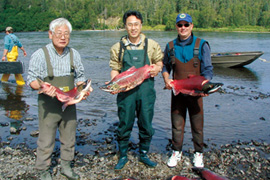The Mitsui & Co. Environment Fund
Introduction to Grant Projects
Faculty of Fisheries Science, Graduate School of Fisheries Sciences, Hokkaido University Professor Masahide Kaeriyama
Sustainability and risk management of northern subarctic wetlands having Pacific Salmon as a keystone species
Research grant
- Project Description
The structure and functioning of an ecosystem rest on biological diversity; that is, the species/genetic diversity acquired over the long process of evolution. A diminishment of diversity invites breakdowns in elements of biological interaction networks, potentially leading to a loss of an environmental service or an inability for restoration. An import challenge for researchers is reveal the mechanisms of such effects and ways of dealing with them or, more broadly, to protect the biological productivity of wetlands and to preserve the rich diversity of their ecosystems. In this research, we turn our attention to oncorhynchus (Pacific salmon), a keystone species* affected by global warming. We seek to establish a sustainability/risk management system based on adaptive management and the precautionary principle within subarctic wetland habitats, now coming under pressure amid global warming. More specifically, we:
(1) survey strategic life histories of Pacific salmon, together with biological interaction between wild and hatchery populations; and
(2) utilize an uncertainty model in evaluating effects of warming on Pacific salmon, better understanding wetland ecosystems in subarctic waters, and assessing human impacts on such ecosystems. We conduct our research together with researchers from the University of Washington, the University of Alaska Fairbank, the University of Alaska Southeast (Juneau), and the Alaska Department of Fish and Game.
* Keystone species: a species having a particularly large effect on its environment; indeed, the ecosystem may be dramatically impacted by its removal.
- Fields
- Climate changeMarine resources/foodPreservation of biodiversity and ecosystem
- Grant year
- FY2007 Research Grants
- Grant term
- 3 years
April 2008 - March 2011
- Grant amount
- 13,710,000 yen
- Activity region
- Hokkaido, Alaska, North Pacific Ocean, Bering Sea

Overview of the Organization

- Representative
- Professor Masahide Kaeriyama
- Profile
- Specialist fields
Marine ecology, fish ecology
Affiliated academic societies
American Fisheries Society; Japanese Society of Fisheries Science; Ecological Society of Japan; Ichthyological Society of Japan; Oceanographic Society of Japan; Japanese Society of Fisheries Oceanography; etc.
Background
Researcher, Faculty of Fisheries Sciences, Graduate School of Fisheries Sciences, Hokkaido University; Visiting professor, University of Alaska Fairbanks (concurrent position); School of Engineering, Hokkaido Tokai University; Ph.D., fisheries science. - Collaborating researchers
- Syuiti ABE, Professor, Faculty of Fisheries Sciences, Graduate School of Fisheries Sciences, Hokkaido University; Sei-Ichi SAITOH, same; Michio KISHI; same; J.E. SEEB, Professor, University of Washington; B. P. FINNEY, Professor, University of Alaska; A. J. GHARRETT, same.
- Research record
-
- (1) Kaeriyama, M., et al. 2008. Global warming as viewed from Hokkaido, Iwanami Shoten
- (2) Kaeriyama, M. 2002.The latest in salmon science. Seizando-Shoten Publishing
- (3) Kaeriyama, M. 2008. Ecosystem-Based Sustainable Conservation and Management of Pacific Salmon. Fisheries for Global Welfare and Environment, pp. 371–380. TERRAPUB.
- (4) Kaeriyama, M. et al. 2007. Spatial and temporal changes in the growth patterns and survival of Hokkaido chum salmon population in 1970-2001. N. Pac. Anadr. Fish Comm. Bull. 4: 251-256.
- (5) Kaeriyama, M. and Edpalina, R. R. 2004. Evaluation of the biological interaction between wild and hatchery population for sustainable fisheries management of Pacific salmon. Stock Enhancement and Sea Ranching, pp. 247-259. Blackwell Publishing.